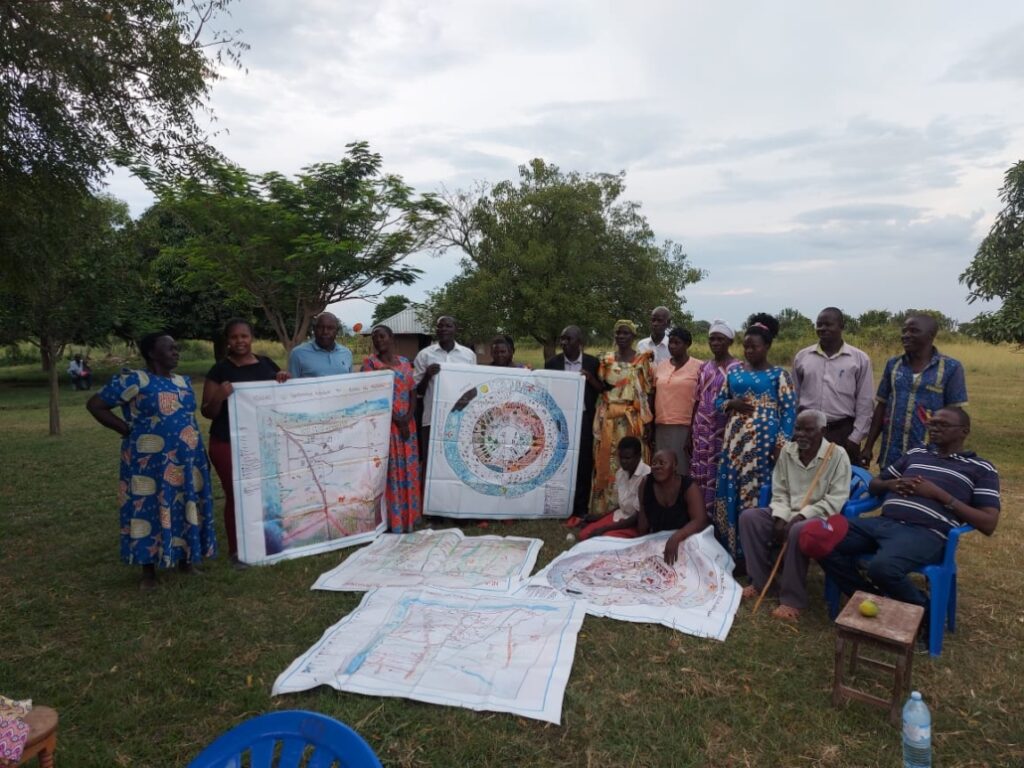
Uganda takes the lead in recognition of customary law
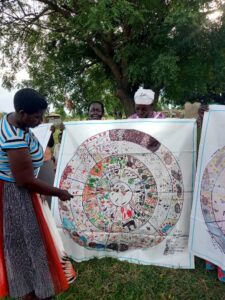
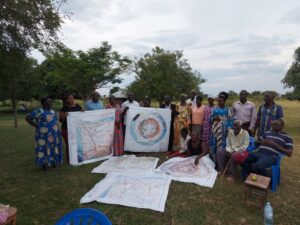
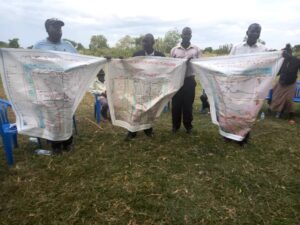
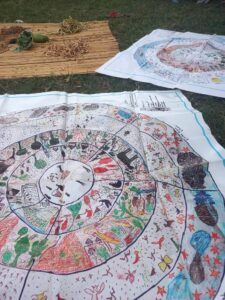
African Institute for Culture and Ecology (AFRICE) is a Non-Governmental Organisation and a founding member of the African Earth Jurisprudence Collective. AFRICE has recently become a partner of the ABN. Over the past five years, AFRICE has been working closely with The Gaia Foundation and Advocates for Natural Resources and Development (ANARDE) on the revival of customary laws and governance systems in western Uganda. The Institute, alongside fellow members of the African Earth Jurisprudence Collective, accompanies indigenous communities in their journey of reviving their sacred natural sites and the restoration of their traditional governance systems. Robert Katemburura, coordinator of programmes at AFRICE, shares how community advocacy has led to the issuance of a Bill for an Ordinance by the Buliisa District Council in Uganda.
Uganda is the first country in Africa to recognize the Rights of Nature in its National Laws, under Section 4 of the National Environment Act of 2019. Drawing on this precedent, in western Uganda indigenous Bagungu communities, working with the Buliisa District Council and other partners, have been pioneering legislation to protect their sacred natural sites and recognise their customary laws.
These customary laws inherently safeguard Nature’s rights to exist, thrive and evolve. Their recognition at local level is a paradigm-shift. AFRICE has been working with these communities to encourage them to continuously protect their forests ecosystems, and to stand up for their rights. Uganda could be the first African country to lead the process of decolonized and eco-centric governance on the continent. This ground-breaking precedent follows several years of community advocacy efforts, with many meetings held with the local authorities in Buliisa District by Bagungu people, accompanied by AFRICE, ANARDE and The Gaia Foundation.
Conservation of the sacred natural sites by the Bagungu community The Bagungu are the indigenous people of the Bagungu region along the shores of Itaka lya Mwitanzige (Lake Albert) in Buliisa District in Western Uganda. The region is bordered by Lake Albert and the Democratic Republic of Congo in the West, River Nile in the North, Murchison Falls National Park in the East and Budongo Forest in the south east. The Bagungu consists of 56 Clans. They hold a strong traditional governance system and are endowed with Sacred Natural Sites, under the care of custodians. These Sacred Natural Sites are areas of spiritual, ecological and cultural significance, and havens for biodiversity.
The Bagungu have undertaken 5-years of intergenerational community dialogues to revive their traditional knowledge and practices, governance systems, seed diversity and community cohesion. This approach allows the community to heal some of the losses suffered under colonialism and neo-colonialism. The journey started with only a few custodians as many were reluctant to come forward since they were constantly demonized by Christianity. In 2015, the custodians were invited to Ethiopia for a meeting of Sacred Natural Sites custodians from various countries in Africa to share their stories of revival of the traditional governance system. This was an historic gathering supported by the ABN and The Gaia Foundation, where common customary laws were distilled. Kagole Margret, one of the women seed custodians represented the custodians and learnt many ideas from the experiences of custodians from other countries. Upon her return, she shared the stories of her experiences with the custodians who were motivated by the stories.
Bagungu community’s customary laws and traditional governance system recognised in district ordinance
Through continued dialogues, the number of custodians increased. Accompanied by AFRICE, they drew ancestral eco-cultural maps on the past order, present disorder and a plan for the future restoration. The women seed custodians drew the ancestral eco-cultural calendars of farming seasons.
The Sacred Natural Sites, the clans responsible and the rituals to be carried out at every site, were identified. In total, there are 32 Sacred Natural Sites in Bagungu land, traditionally safeguarded by 26 custodian clans. The custodians and clan leaders formed an Association with a governing Constitution, which sets out their roles, responsibilities and they have compiled their customary laws regulating water bodies, farming, fishing, hunting and presented. Armed with these materials, their maps, calendars and customary laws, the Association of custodians requested that Buliisa District Local Government recognise their Sacred Natural Sites and the need to protect and restore these wetlands and forests.
A resolution was passed in 2019, followed by meetings and consultations among custodians, clan leaders, government authorities and other stakeholders. In 2020, Buliisa District Council made a landmark decision:
An ordinance to recognise and implement the Bagungu Customary Laws of the Nganda Zilamansi zya Bagungu (Bagungu Custodian Clans); to acknowledge that the customary governance system and identity of the Bagungu People are rooted in their ancestral lands, now encompassed by modern day Buliisa District; to recognise Mpuluma (Sacred Natural Sites) as places of spiritual, cultural and ecological significance that are embedded in the ancestral territories of the Bagungu People; to establish structures to protect Mpuluma, and the rights of Buhangwa (Nature) in Buliisa District through Bagungu Customary Laws; and other related matters.
The Ordinance is currently with the Attorney General for approval, and is the first of its kind in Uganda and the rest of Africa.
What does the Ordinance include?
The Ordinance, an example of plurilegal systems in practice, provides for the protection of an interconnected network of Sacred Natural Sites embedded within Bagungu ancestral territory which are places of spiritual, cultural, ecological significance and potency. The custodians play a vital role in governing human activity in these highly sensitive ecosystems. Wetlands and lake shores, for instance, are recognized as sacred and off-limits for farming, fishing, hunting or other activities that would damage these vital havens for wildlife and fish.
By recognizing the existence and importance of Bagungu customary laws and sites, the Ordinance is an important step towards re-empowering the Bagungu community to restore the resilience of their ancestral lands and Earth-centred traditions. The Ordinance also recognises the rights of custodians to continue to access the Sacred Natural Sites for which they are responsible.
Another important provision of this Ordinance is the creation of a co-governance body led by Bagungu custodians and District officials which will oversee its implementation, promote, protect the health and well-being of Sacred Natural Sites.
AFRICE and ANARDE continue with their advocacy at national level to sensitise the national government on the Ordinance approved at the District level.
The African Earth Jurisprudence Collective
These promising developments at district and national level in Uganda are part of a wider movement in Afri ca, committed to reviving Indigenous knowledge and customary governance systems.
An African Earth Jurisprudence Collective is working in East, West and Southern Africa to revive and re-valorise ways of life that defend and restore the relationship between Africa’s peoples and her lands, waters and forests after centuries of colonial harm.
Central to this work is the philosophy and practice of Earth Jurisprudence (EJ), which calls for a transformation of our relationship with Mother Earth, from human-centred to Earth-centred cosmologies, ways of living, laws and governance. You can find out more here: www.earthjurisprudence.africa